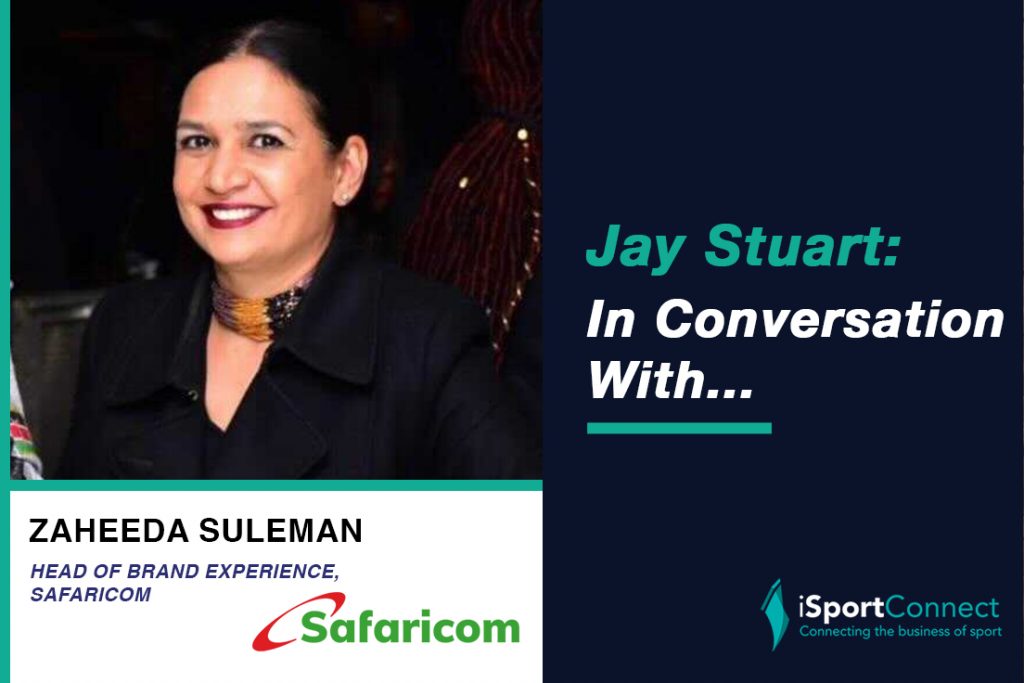Athletics Is A Gold Medal Sport For Safaricom
August 2, 2021
Jay Stuart talks to Zaheeda Suleman, Head of Brand Experience at Safaricom.
With the Olympics Games in Tokyo well underway, athletes from Kenya, a country where the public passionately follows the Games, are making their nation proud and likely to be rising to the podium many times, particularly in the athletics events.
Those heroes and heroines will have a strong association in the fans’ minds with the brand of Safaricom, the largest telco in the region, one which you may have even seen already.
“Safaricom recently announced a KES20 million ($185,000) sponsorship of Team Kenya’s ceremonial kit.”
Safaricom recently announced a KES20 million ($185,000) sponsorship of Team Kenya’s ceremonial kit, and it has committed to sponsoring individual athletes like up-and-coming sprinter Mark Otieno. With men and women of the national team winning six gold medals in Rio along with six silvers a bronze, all in athletics, it’s not surprising that the sport is hugely popular in Kenya, where Safaricom, in which Vodafone has a 40% stake, controls 65% of the market with 35 million subscribers.
“Football is number one in popularity but athletics is easily number two because we do so well and running is just what we do,” says Zaheeda Suleman, Safaricom’s Head of Brand Experience. “The popularity of athletics has more to do with patriotism.”
This is a big year for sports events in Kenya. The country will host the World Under-20 Athletics Championships in August, and the World Rally Championship recently returned to Kenya after an absence of 19 years.
Safaricom first got into sports sponsorship 20 years ago with what is now the Lewa Safari Marathon, running through the Lewa Wildlife Conservancy. Safaricom remains a committed partner of the event, which has raised millions of dollars to fund the Tusk wildlife conservation project as well community development, education and healthcare initiatives across Kenya. Because of the covid pandemic the last two editions have been virtual experiences.
“Safaricom’s sponsorship strategy sees sport not only as a way to connect with consumers at passion points”
Safaricom’s sponsorship strategy sees sport not only as a way to connect with consumers at passion points like football and athletics, but also by contributing to their health, education and economic empowerment.
“With anything we do we look at what the impact is on human life,” Zaheeda says. “We’re not doing it for the sake of doing it. It’s great for visibility, but it has to make a difference.”
Safaricom’s sponsorship of football is a good example. “We have over 30,000 kids taking part in our grassroots league. It gives the players a chance to showcase their talent and their skills. Three of our players were recently scouted and now they’re in university in the U.S.
“If it hadn’t been for the league, these kids probably would never have had that opportunity. So it’s not just about brand visibility or even playing sport. We ask ourselves every time what real impact this particular sponsorship is going to have on the Kenyan consumer.”
“Digital platforms and our phones are giving people things they couldn’t experience before without being there in person.”
As a telco, Safaricom also provides a platform for more people to enjoy watching sport. Zaheeda says, “You have people at an airport waiting until the last minute to board the flight just to get the result of a football match in another part of the world.
“Digital platforms and our phones are giving people things they couldn’t experience before without being there in person. This digital era is making sport a lot more accessible and affordable, and it’s not just a passive engagement.”


